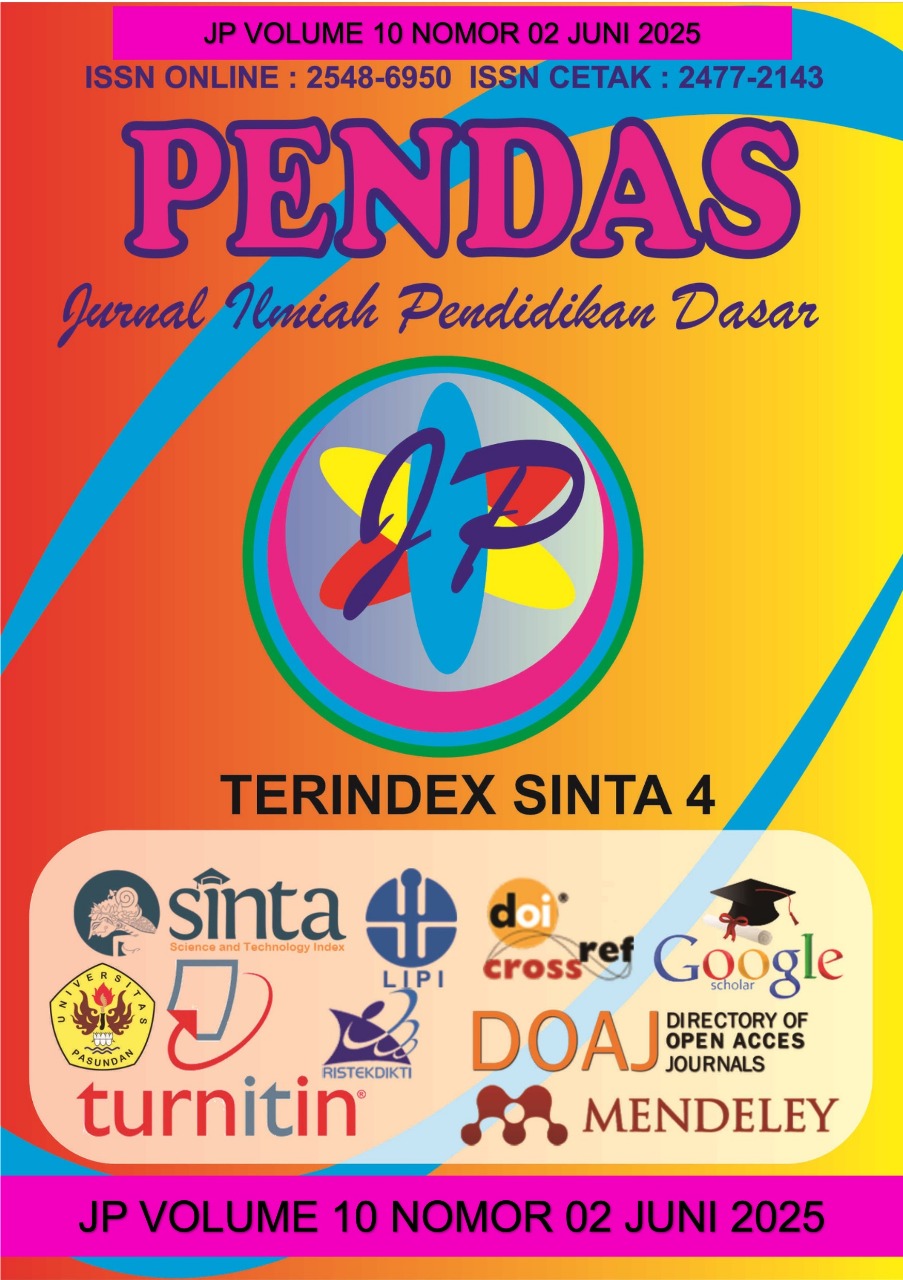PENERAPAN MODEL PEMBELAJARAN PROBLEM BASED LEARNING DENGAN PENDEKATAN CULTURALLY RESPONSIVE TEACHING UNTUK MENINGKATKAN HASIL BELAJAR PENDIDIKAN PANCASILA SISWA KELAS III B SDN 4 PALANGKA
DOI:
https://doi.org/10.23969/jp.v10i2.26465Keywords:
learning outcomes, pancasila education, culturally responsive teaching, problem-based learningAbstract
This classroom action research was conducted to improve student learning outcomes in the subject of Pancasila Education by implementing the Problem-Based Learning (PBL) model combined with the Culturally Responsive Teaching (CRT) approach. The study involved 13 third-grade students at SDN 4 Palangka during the even semester of the 2024/2025 academic year. The research was conducted in two cycles, with each cycle consisting of one meeting. The learning process was carried out using the PBL model that emphasizes problem-solving and was integrated with the CRT approach, which respects students' cultural backgrounds to make learning more contextual and meaningful. The research data were collected through observation, documentation, and tests administered at the end of each cycle. The results of the pre-cycle showed a class average score of 52.30, with only 30.77% of students achieving the minimum mastery criteria (KKM). In Cycle I, the class average increased to 70.76 with 69.23% mastery. In Cycle II, there was a significant improvement with an average score of 90.00 and 84.61% of students achieving mastery. These findings indicate that the application of the PBL model combined with the CRT approach effectively enhances students’ learning outcomes in Pancasila Education.
Downloads
References
Azizah, A. (2021). Pentingnya Penelitian Tindakan Kelas Bagi Guru dalam Pembelajaran. Auladuna : Jurnal Prodi Pendidikan Guru Madrasah Ibtidaiyah, 3(1), 15–22. https://doi.org/10.36835/au.v3i1.475
Evi, T., & Indarini, E. (2021). Meta Analisis Efektivitas Model Problem Based Learning dan Problem Solving Terhadap Kemampuan Berpikir Kritis Mata Pelajaran Matematika Siswa Sekolah Dasar. Edukatif : Jurnal Ilmu Pendidikan, 3(2), 385–395. https://doi.org/10.31004/edukatif.v3i2.314
Girsang, B., Maryanti, I., Nasution, U., Matematika, P. P., Muhammadiyah, U., & Utara, S. (2024). Penerapan Model Pbl Terhadap Hasil Belajar Siswa. JMES (Journal Mathematics Education Sigma), 162–169.
Hani Hiqmatunnisa, & Ashif Az Zafi. (2020). Penerapan Nilai-Nilai Moderasi Islam Dalam Pembelajaran Fiqih Di Ptkin Menggunakan Konsep Problem-Based Learning. Jipis, 29(1), 27–35. https://doi.org/10.33592/jipis.v29i1.546
Hartini, R. (2025). Penggunaan Pendekatan Culturally Responsive Teaching ( CRT ) Untuk Meningkatkan Hasil Belajar Pendidikan Pancasila Pada Siswa Kelas III SDN 18 Ampenan. 10, 173–178.
Pasaribu, A., Harahap, P. R. M., Siregar, R. L., Mardiah, S. A. R., Mawaddah, T. A., & Sitorus, M. (2023). Optimalisasi Kecerdasan Majemuk Anak Usia Dini dengan Permainan Tradisional Batu Serimbang Usia 5-6 Tahun di RA Kurnia 2 Marelan. Journal on Education, 5(2), 2266–2274. https://doi.org/10.31004/joe.v5i2.880
Renata Dynawantika, Dewi Tryanasari, J. S. (2024). Penerapan Model Pbl Dengan Pendekatan. Jurnal Ilmiah Pendidikan Dasar, 09(September).
Sari, N. (2020). Pendidikan Berbasis Kearifan Lokal Untuk Membentuk Karakter Siswa Sekolah Dasar. Jurnal Penelitian, Pendidikan Dan Pengajaran: JPPP, 1(1), 27. https://doi.org/10.30596/jppp.v1i1.4452
Setiyaningrum, M. (2018). Peningkatan Hasil Belajar Menggunakan Model Problem Based Learning (PBL) pada Siswa Kelas 5 SD. Jartika: Jurnal Riset Teknologi Dan Inovasi Pendidikan, 1(2), 99–108.
Somayana, W. (2020). Peningkatan Hasil Belajar Siswa melalui Metode PAKEM. Jurnal Pendidikan Indonesia, 1(03), 283–294. https://doi.org/10.59141/japendi.v1i03.33
Syah, R. H. (2020). Dampak Covid-19 pada Pendidikan di Indonesia: Sekolah, Keterampilan, dan Proses Pembelajaran. SALAM: Jurnal Sosial Dan Budaya Syar-I, 7(5). https://doi.org/10.15408/sjsbs.v7i5.15314
Widiastuti, E. R., & Kurniasih, M. D. (2021). Pengaruh Model Problem Based Learning Berbantuan Software Cabri 3D V2 terhadap Kemampuan Literasi Numerasi Siswa. Jurnal Cendekia : Jurnal Pendidikan Matematika, 5(2), 1687–1699. https://doi.org/10.31004/cendekia.v5i2.690
Downloads
Published
Issue
Section
License
Copyright (c) 2025 Pendas : Jurnal Ilmiah Pendidikan Dasar

This work is licensed under a Creative Commons Attribution 4.0 International License.














































